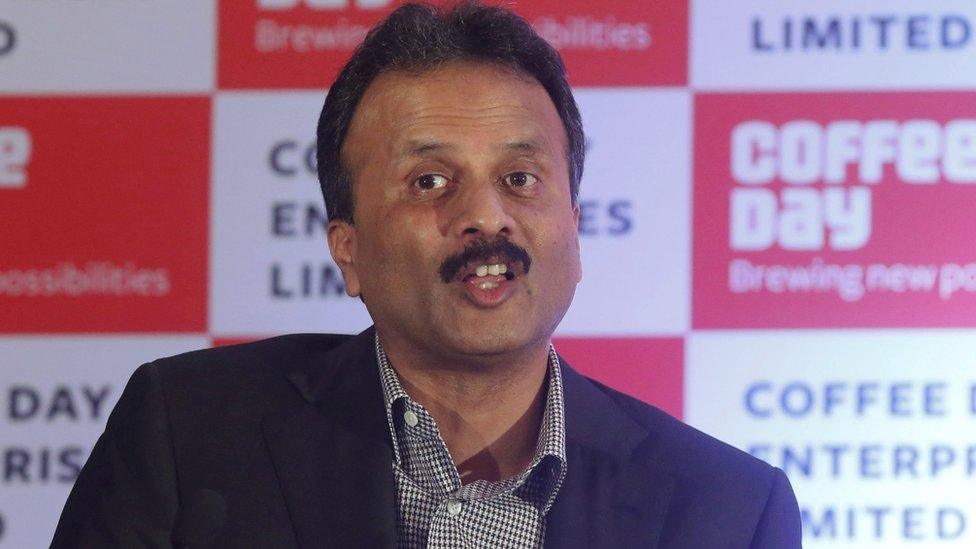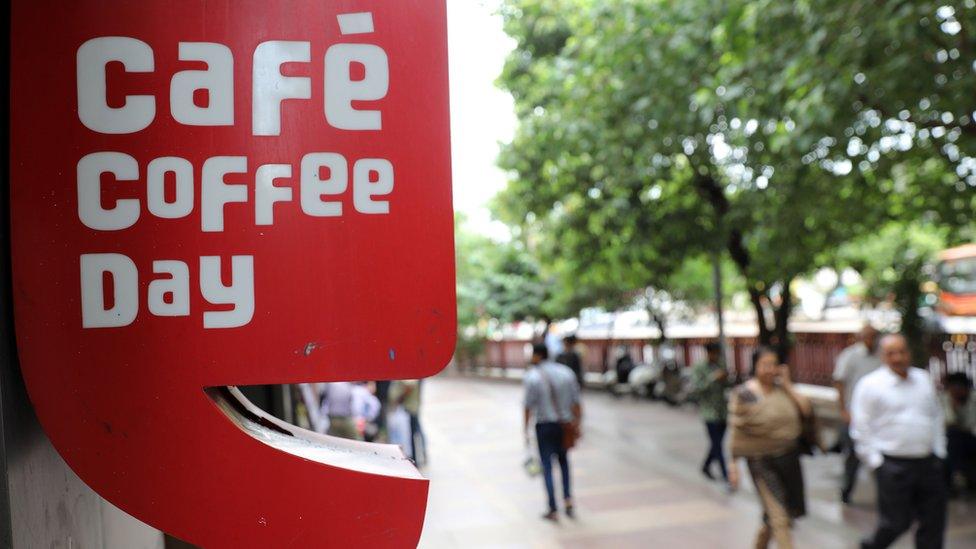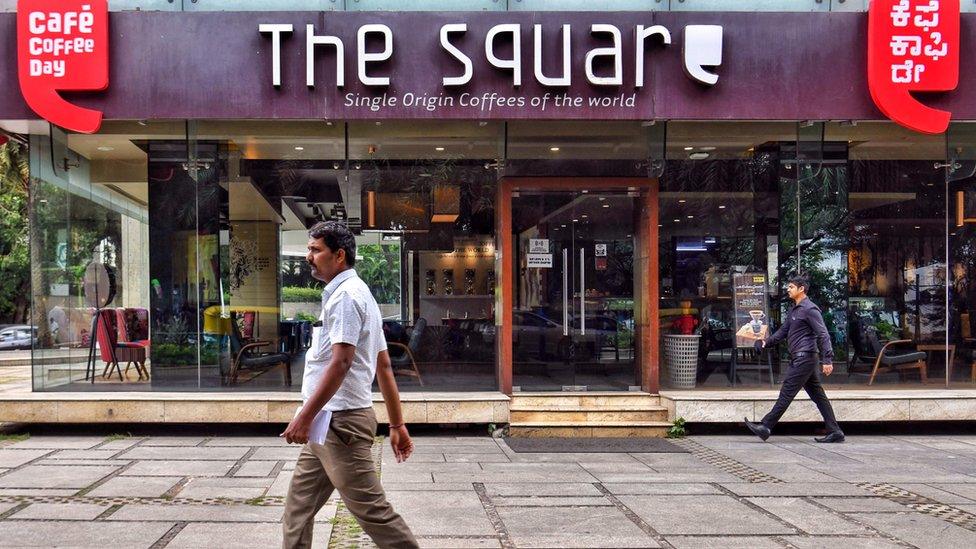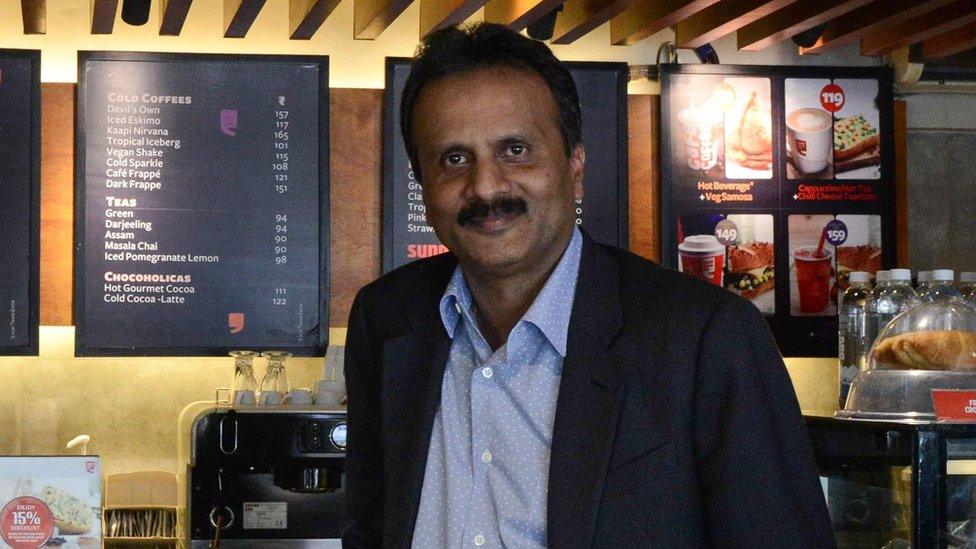VG Siddhartha: The coffee king of India
- Published

The death of VG Siddhartha, the founder and owner of Café Coffee Day, has sent shockwaves across the business community in India.
His body was found in the early hours of Wednesday morning near a river on the outskirts of the southern Indian city of Mangalore.
Despite running India's largest coffee chain, Mr Siddhartha was a media-shy and aloof entrepreneur who kept away from the spotlight.
Even though he maintained a very low profile, the brand he created went on to symbolise the rise of India's economic stature on the global map.
Mr Siddhartha was born to a family of coffee plantation owners in Chikmagalur, a lush hill station located in the southern state of Karnataka.
He started his career as an investment banker in the 1980s, but soon started to invest in the stock markets himself.
His first big break came post-1991, when the Indian economy was liberalised, lifting restrictions on the coffee trade.
This paved the way for him to start a coffee beans business in 1993. Within two years, his company became one of the largest exporters of coffee from India.
Rapid growth
Inspired by the cafe culture in the West, he started toying with the idea of starting a coffee chain in India. Initially he was discouraged by his colleagues, who thought cappuccino would not find many takers in what was primarily a tea-drinking nation.
But Mr Siddhartha didn't abandon the plan. Then a chat with the owners of Tchibo, a German coffee chain, encouraged him to put the plan into action.
In 1996, he opened the first Café Coffee Day outlet at an upscale locality in Bangalore with the slogan: "A lot can happen over a cup of coffee."
The cafe became an instant hit among young people, with students and corporate executives under the age of 30 spending hours there sipping coffee.

Café Coffee Day has more than 1,700 stores in more than 200 cities
The popularity fuelled rapid growth for the company in the late 1990s and 2000s. Café Coffee Day opened its first international outlet in Vienna in 2005. By 2011, it had opened more than 1,000 stores.
Bangalore-based brand consultant Harish Bijoor describes Mr Siddhartha as the Howard Schultz of India. Mr Schultz, the former long-serving chief executive of Starbucks, was instrumental in transforming the US-based coffee company into an iconic international brand.
"Siddhartha revolutionised the coffee culture in India. He was the undisputed coffee king," Mr Bijoor told the BBC.
Different formats
The business model of Café Coffee Day was based on three principles: affordable coffee, good ambience and quality service.
Throughout this period, Mr Siddhartha kept evolving the business by coming up with different store formats to meet the demands of multiple customer groups.
While Café Coffee Day was targeted towards young people who wouldn't want to pay more than $1 to $1.50 for a coffee, he also opened a few lounge-style outlets focused on premium customers, who didn't mind spending more money for added services.
These cafes had more food options on the menu, while wi-fi was often provided for nothing, a rarity in those days.
"Coffee along with internet was a deadly combination at that time," adds Mr Bijoor.
Today the company has more than 1,700 stores in more than 200 cities, including Prague, Vienna and Kuala Lumpur.
New rivals
After sailing through for more than a decade without any serious competition, Café Coffee Day started to feel the heat in 2012, with the arrival of international chains in India including Starbucks and Costa Coffee. The company had to slow its expansion because of cut-throat competition.
In 2015, to raise more money, Mr Siddhartha took the company public by listing it on the Indian stock exchange. But it got a tepid response from investors, with the company's share price falling 18% on the first day of trading.

Cafe Coffee Day has also opened premium outlets branded as The Square
Shubhranshu Pani of JLL, a real estate firm that advises Café Coffee Day, says that after that, the company started to shut down non-profitable stores to trim its losses.
"They realised that they had to change their strategy to fight competition," Mr Pani told the BBC.
The move worked. Café Coffee Day has made profits consecutively for the last three financial years.
But one major obstacle, rising debt, has continued to hurt growth. The company's overall debt was just under $1bn for the financial year ending in March 2019.
Potent brand
To reduce the firm's borrowings, Mr Siddhartha sold 20.41% of his investment in Mindtree, an Indian IT firm, for more than $450m earlier this year.
There were also reports that Mr Siddhartha was in talks with investors including Coca-Cola to sell part of his stake in Café Coffee Day to bring down the debt. However, the company and Coca-Cola have never confirmed those reports.
But the rising debt issue has also dented the company's market valuation.
In January 2018, Café Coffee Day's share price touched an all-time high, taking the market capitalisation of the company to more than $1bn, but since then, the shares have fallen sharply in value.
In fact, since Tuesday, when the news of Mr Siddhartha's disappearance first emerged, the share price has fallen by more than 35%.
Despite the challenges, analysts believe that Cafe Coffee Day is a potent brand that has a bright future if managed properly - which is all the more reason why Mr Siddhartha's sudden demise has left many in the Indian business world in shock.
A recent letter, sent by the tycoon to the Cafe Coffee Day board, may contain clues as to what happened.
In it, Mr Siddhartha lamented that he had "failed to create the right profitable business model despite my best efforts".
He also said he was in debt, "solely responsible for all mistakes" and had "failed as an entrepreneur."
And he accused a former director general of the income tax department of harassing him, which he says led to a "serious liquidity crunch".
His family has vouched for the authenticity of the letter, which has been widely shared, but others have questioned it.
A political storm is now gathering around the affair, and the company has appealed for calm. In a letter to investors it appealed for the "the support and strength" of all its stakeholders, while promising to ensure the "continuity" of the business.
- Published31 July 2019
